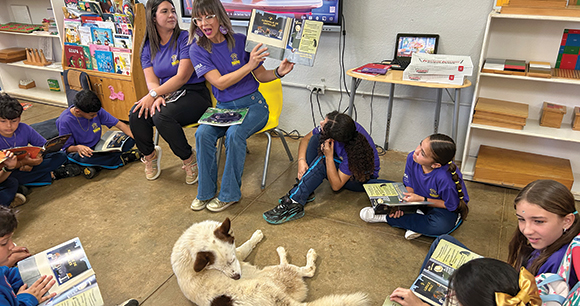Beneath “a sliver of moon, no wider than a cat’s whisker,” Kamie the cat navigates frightening city streets, back alleys, and an animal shelter to find her way home. In the process, the orange tabby teaches young readers kindness and respect for their feline friends.
Kamie Cat’s Terrible Night, published by AWI through a collaboration with award-winning author and illustrator, Sheila Hamanaka, is one of two colorful children’s books (written in English and translated into Spanish) that AWI donated to help teachers in Puerto Rico bring humane education to the classroom. The other book, Pablo Puppy’s Search for the Perfect Person, also written and illustrated by Hamanaka, recounts the plight of a puppy and an older dog living in a shelter, teaching the importance of humane treatment of animals.

In total, AWI shipped 1,600 Kamie and Pablo books to Puerto Rico, in addition to donating about 400 copies each of two books for older students, Roots of Human Behavior and The Magic of Touch. The former, by Viktor Reinhardt, DVM, PhD (who now serves on AWI’s Scientific Committee), examines the parallels between animal and human expressions, emotions, and psychology. The latter, by Viktor and Annie Reinhardt, explores the essential role of physical contact in the social lives of all animals.
FePA (Federación Protectora de Animales de Puerto Rico)—a nonprofit umbrella organization for the island’s animal protection groups, shelters, and advocates—approached AWI to provide resources for humane education workshops held during a conference in Caguas in October 2024. At that conference, 50 teachers representing disciplines from health to fine arts to early childhood development learned about the human-animal bond and its impact on educational outcomes, current challenges to animal welfare reform in Puerto Rico, and other topics related to our relationship with animals.
After Hurricane Maria pummeled the island in 2017, the stray animal population spiked to up to half a million stray dogs and 1 million cats, according to Yolanda Álvarez, PhD, FePA’s board president and an attorney who has studied stray animal overpopulation trends in Puerto Rico. The few municipal animal shelters that exist today are mostly crammed with companion animals who have been surrendered.
“The majority of Puerto Ricans really love their companion animals; it’s a problem of resources and education,” Álvarez hastens to explain. “If you don’t get to the root of the problem, you’re going to have people who buy animals on impulse and then just throw them on the street.” She adds, “The books provided by AWI are foundational tools for our teachers, and thereby our students, as they enrich discussions and foster empathy and understanding toward animals. By promoting humane values, such literature plays a key role in shaping a compassionate society and a peaceful country.”
FePA is now working with the Puerto Rico Department of Education to expand the workshops across the island. Álvarez says the response among participants has been overwhelmingly positive, with teachers expressing genuine motivation to incorporate the animal-themed storylines into their lesson plans.
Since 2020, AWI has donated more than 87,000 books to literacy groups and humane education programs, reaching children of all ages throughout the country. For select titles, including Kamie and Pablo, AWI also offers free classroom activities and lesson plans that can be easily implemented.
Regina Terlau-Benford, director of AWI’s Humane Education Program, says that Kamie and Pablo “teach basic care, compassion, and respect for companion animals, while helping children of all backgrounds improve their interpersonal and problem-solving skills.”
“Since many children have a natural affection for animals, they readily engage with animal-centric storylines, which can ease them into confronting more complicated subjects—both at school and in the home.” Last year, when Terlau-Benford read Pablo to a first-grade class in North Carolina, one of the students mentioned that her father had kicked their dog. This comment was relayed to the girl’s teacher. AWI also offers a handout for educators, including a list of questions for students who disclose animal abuse and a summary of appropriate next steps if there is reason to believe that the animal and/or the child might be experiencing violence at home.
Currently, only nine states require or authorize humane education instruction, according to AWI’s research. As more school districts recognize the field’s benefits, such as fostering critical thinking, empathy, and responsibility, more children will develop a deeper connection with the natural world and their role in it.
“Our young people today will inherit no small amount of challenging global issues,” notes Terlau-Benford. “Humane education seeks to empower them to improve the lives of animals and other vulnerable members of our society, preparing the next generation of compassionate citizens.”